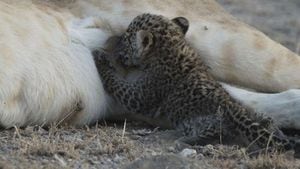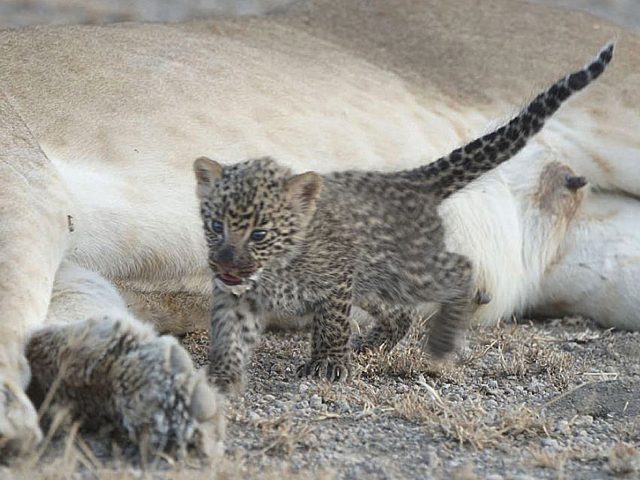‘Extremely unique’ lioness nurses leopard cub in Tanzania
The leopard appeared to have lost contact with its mother.

Newly released photographs from a Tanzanian wildlife area have shown the rare sight of a leopard cub suckling on a lioness that is believed to have given birth to a litter last month.
The five-year-old lioness lies unperturbed as the small leopard, estimated to be a few weeks old, nurses in the photographs taken by a guest at a lodge in the Ngorongoro Conservation Area, a United Nations World Heritage site.
“To observe a thing like this is very unusual,” said Ingela Jansson, head of the KopeLion conservation group, which seeks to resolve conflict between lions and local residents who hunt the predators to protect their livestock.
The lioness, fitted with a GPS collar so researchers can track her, may have lost her own cubs and was therefore open to feeding the leopard cub, Ms Jansson said. The leopard appeared to have lost contact with its mother, she added.
“Cross-species nursing for wild cats, and other wildlife for that matter, is extremely unique,” according to Panthera, a wild cat conservation group based in New York.
There have been cases of adoptions and suckling among wild cats and other animals of the same species, as well as cases of birds feeding chicks of another species whose eggs were inadvertently laid in their nests, according to conservationists.

“It’s really mysterious,” said Luke Hunter, president and chief conservation officer of Panthera.
He said it was unclear whether the leopard’s mother was still around and could retrieve the cub from “lioness day care”, which would be the best possible outcome.
He warned that “the natural odds are stacked against this little fellow”, which may have since been killed by other lions that recognised it was not one of their own.
Even in normal circumstances, only 40% of lion cubs in the area, part of the Serengeti ecosystem, survive their first year, Mr Hunter said.
Known as Nosikitok, the lioness that fed the leopard was seen with other lions but without cubs of any kind the day after the photographs were taken by Joop van der Linde, a guest at Ndutu Safari Lodge.
Ms Jansson jokingly described the nursing as a case of “confusion at the supermarket” in which the lioness “picked up the wrong kid”.





